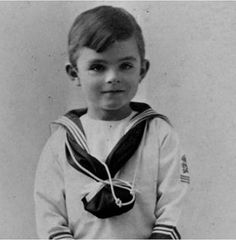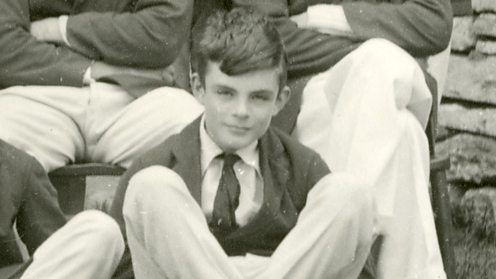
Turing was born in Maida Vale, London, while his father, Julius Mathison Turing (1873–1947), was on leave from his position with the Indian Civil Service (ICS) at Chatrapur, then in the Madras Presidency and presently in Odisha state, in India. Turing's father was the son of a clergyman, the Rev. John Robert Turing, from a Scottish family of merchants that had been based in the Netherlands and included a baronet. Turing's mother, Julius' wife, was Ethel Sara Turing (1881–1976), daughter of Edward Waller Stoney, chief engineer of the Madras Railways. The Stoneys were a Protestant Anglo-Irish gentry family from both County Tipperary and County Longford, while Ethel herself had spent much of her childhood in County Clare.
Julius' work with the ICS brought the family to British India, where his grandfather had been a general in the Bengal Army. However, both Julius and Ethel wanted their children to be brought up in Britain, so they moved to Maida Vale, London, where Alan Turing was born on 23/June/1912, as recorded by a blue plaque on the outside of the house of his birth, later the Colonnade Hotel. Turing had an elder brother, John.
Turing's father's civil service commission was still active and during Turing's childhood years Turing's parents travelled between Hastings in England and India, leaving their two sons to stay with a retired Army couple. At Hastings, Turing stayed at Baston Lodge, Upper Maze Hill, St Leonards-on-Sea, now marked with a blue plaque. The plaque was unveiled on 23 June 2012, the centenary of Turing's birth.
Very early in life, Turing showed signs of the genius that he was later to display prominently. His parents purchased a house in Guildford in 1927, and Turing lived there during school holidays. The location is also marked with a blue plaque.
Turing's parents enrolled him at St Michael's, a day school at 20 Charles Road, St Leonards-on-Sea, at the age of six. The headmistress recognised his talent early on, as did many of his subsequent teachers.
Between January 1922 and 1926, Turing was educated at Hazelhurst Preparatory School, an independent school in the village of Frant in Sussex. In 1926, at the age of 13, he went on to Sherborne School, a boarding independent school in the market town of Sherborne in Dorset. The first day of term coincided with the 1926 General Strike in Britain, but he was so determined to attend, that he rode his bicycle unaccompanied 60 miles from Southampton to Sherborne, stopping overnight at an inn.
Turing's natural inclination towards mathematics and science did not earn him respect from some of the teachers at Sherborne, whose definition of education placed more emphasis on the classics. His headmaster wrote to his parents: "I hope he will not fall between two stools. If he is to stay at public school, he must aim at becoming educated. If he is to be solely a Scientific Specialist, he is wasting his time at a public school". Despite this, Turing continued to show remarkable ability in the studies he loved, solving advanced problems in 1927 without having studied even elementary calculus. In 1928, aged 16, Turing encountered Albert Einstein's work; not only did he grasp it, but it is possible that he managed to deduce Einstein's questioning of Newton's laws of motion from a text in which this was never made explicit.
At Sherborne, Turing formed a significant friendship with fellow pupil Christopher Morcom (1911 – 1930), who has been described as Turing's "first love". Their relationship provided inspiration in Turing's future endeavours, but it was cut short by Morcom's death, in February 1930, from complications of bovine tuberculosis, contracted after drinking infected cow's milk some years previously.
The event caused Turing great sorrow. He coped with his grief by working that much harder on the topics of science and mathematics that he had shared with Morcom. In a letter to Morcom's mother Turing said: "I am sure I could not have found anywhere another companion so brilliant and yet so charming and unconceited. I regarded my interest in my work, and in such things as astronomy as something to be shared with him and I think he felt a little the same about me ... I know I must put as much energy if not as much interest into my work as if he were alive, because that is what he would like me to do."
Turing's relationship with Morcom's mother continued long after Morcom's death, with her sending gifts to Turing, and him sending letters, typically on Morcom's birthdays. A day before the third anniversary of Morcom's death (12 February, 1933), he wrote to Mrs. Morcom: "I expect you will be thinking of Chris when this reaches you. I shall too, and this letter is just to tell you that I shall be thinking of Chris and of you tomorrow. I am sure that he is as happy now as he was when he was here. Your affectionate Alan."
Some have speculated that Morcom's death was the cause of Turing's atheism and materialism. Apparently, at this point in his life he still believed in such concepts as a spirit, independent of the body and surviving death. In a later letter, also written to Morcom's mother, Turing said: "Personally, I believe that spirit is really eternally connected with matter but certainly not by the same kind of body ... as regards the actual connection between spirit and body I consider that the body can hold on to a 'spirit', whilst the body is alive and awake the two are firmly connected. When the body is asleep I cannot guess what happens but when the body dies, the 'mechanism' of the body, holding the spirit is gone and the spirit finds a new body sooner or later, perhaps immediately."

